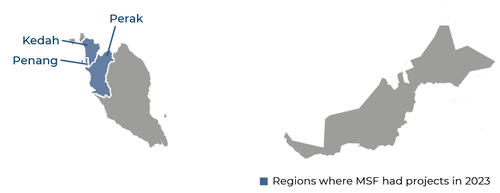More than 4,400 Rohingya refugees attempted to make perilous boat journeys from Bangladesh or Myanmar to Malaysia in 2023, an increase of over 20 per cent in comparison to 2022*.
The Malaysian government continued its deterrence-based policies against refugees, such as immigration raids and arrests, detention, discrimination and deportation. Many children are still held in immigration detention centres with adults, in spite of calls for alternative accommodation. Some have been transferred to dedicated detention centres for mothers and children, but to date there is no alternative to detention.
MSF teams work with refugees in urban settings and immigration detention centres, and through fixed and mobile clinics in Penang, offering general healthcare, mental health support and patient referrals to other health providers and the UN refugee agency, UNHCR. Due to our efforts, hepatitis C treatment is now provided free of charge to all refugees registered with UNHCR in Malaysia.
In the three immigration detention centres where we work, we provide medical and psychosocial care and distribute essential hygiene items, such as soap and sanitary pads. We also conduct training on medical and mental health topics for immigration officers. In 2023, our teams saw a high demand for antenatal care and family planning services.
Advocacy is a key part of our programme in Malaysia, primarily through engagement with government stakeholders. We continue to oppose the detention of refugees in immigration centres, and call for them to be issued with identity documents so that they can obtain healthcare insurance and greater protection in the country. We also advocate for free access to vaccinations for all children in Malaysia.
*https://www.aljazeera.com/news/2024/1/24/unhcr-569-rohingya-died-at-sea-in-2023-highest-in-nine-years





